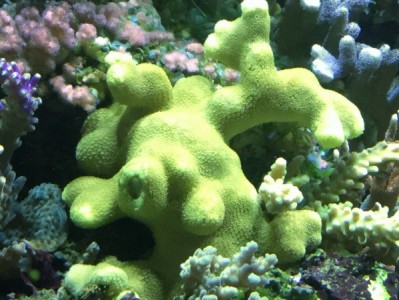- Name:
Branching Porites
- Family: Poritidae
- Species: Porites
- Scientific Name: Porites sp


General info about Branching Porites
In general, corals coming from the genus Porites are characterized by having a finger like assymetrical morphology. They have calices that are widely spaced and reticulum with walls that are well developed. Porites are known to host a variety of marine worms, particularly the Christmas Tree worm (Spirobranchus porites).
For the Branching Porites, they are predominatly colored brown with yelow-brown tentacles. This are the water parameters for cultivating Branching Porites:
- Calcium: 400 - 450 ppm
- Alkalinity: 2.86 - 3.93 MEQ/L (8 - 11 dKH)
- Phosphates: 0
- Magnesium: 1200 - 1350
- Strontium: 8 -10
- Temperature: 74° - 83° F (23° - 28° C)
- Salinity / Specific Gravity: 1.023 - 1.025
Branching Porites Diet & Nutrition
Branching Porites can survive without feeding courtesy from the nourishment it recieves from the symbiotic zooxanthellae that is living within them. However, they will not grow in to a bigger colony. With this and for faster growth, you need to feed them with supplemental foods like krill, mysis or brine shrimp. The addition of dissolved organics is also recommended.
Fragging / Propagating Branching Porites
A mature tank is highly recommended in propagating Branching Porites. They need to be set at the bottom portion of the tank where lighting and flow rate are in moderation.
Flow / Lighting Requirements for Branching Porites
Branching Porites requires moderate lighting and moderate water flow. Too much water flow causes the polyps to be retracted and feeding cannot take place.
Branching Porites Origin
Branching Porites can be found in the Indo-west Pacific Ocean. However, their global population is considered vulnerable due to increasing seawater temperature and other factors associated with climate change. They are now listed under Appendix II of the Convention on International Trade in Endangered Species (CITES), which means that their global trading is now monitored.
Caution Should be Taken with Branching Porites
Branching Porites must be set in the tank with enough spacing in relation to other coral species.
How to Acclimate Branching Porites
Since the Branching Porites are a marine species, salinity must be entirely maintained at 1.023 to 1.025 specific gravity. They should be immediately set to its receiving substrate like rocks and be permanently positioned using gel glue so that the colonization process can commence.
Stinging Tentacles on Branching Porites
Branching Porites have long sweeper tentacles. If they are set near to another coral, they will extend out their tentacles and invade other polyps which has been proven to cause mortality.
Original Detail
| Name | Species | Family | Scientific Name | More Detail | Added by |
|---|---|---|---|---|---|
| Branching Porites | Porites | Poritidae | Porites sp | In general, corals coming from the genus Porites are characterized by having a finger like assymetrical morphology. They have calices that are widely spaced and reticulum with walls that are well developed. Porites are known to host a variety of marine worms, particularly the Christmas Tree worm (Spirobranchus porites). For the Branching Porites, they are predominatly colored brown with yelow-brown tentacles. This are the water parameters for cultivating Branching Porites:
|
PalaciosAn |


